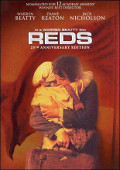
Directed by
Warren Beatty
200 minutes
Rated M
Reviewed by
Bernard Hemingway


Reds
Beatty's finest hour (well, three hours and twenty minutes) to date is a big budget epic biopic tracing the history of John Reed, journalist and author of “Ten Days That Shook The World”, an eyewitness account of the Russian Revolution, who became infamous in the America at the time of WWI as a proselytiser of the Communist cause.
Some critics found it over-blown but Beatty took out the Best Director Oscar, Vittorio Storaro got the guernsey for Best Cinematography and Maureen Stapleton won for Best Supporting Actress (in a surprise turn of events, the Best Picture Oscar went to the far less demanding Chariots Of Fire).
Whilst Beatty has never to been able to sustain his humanist vision in his subsequent efforts, credit goes to him for his achievement with this film which takes a story of fervent anti-capitalism into a medium which is notorious for propagating the American way.
Reds is a glorious (and arguably over-detailed) production that charts the story of Reed (Warren Beatty), an idealistic young journalist from Portland and his relationship with Louise Bryant (Diane Keaton). Abandoning her staid marriage after being swept away by Reed’s force of personality and commitment to socially-advanced ideas and in her pursuit of her ambitions to “write”, she follows him into the hot-bed of Greenwich Village free-thinkers of the time that included Eugene O’Neill (an improbable but effective Jack Nicholson), with whom she has an affair, and pioneer feminist Emma Goldman (Stapleton). After the success of Reed’s book, which was based on their first-hand experience, things started to unravel as he became embroiled in American Left faction politics which led him to returning to Russia, where he found the dream fading under Lenin’s rule as a totalitarian state emerging and where he died from tuberculosis and kidney failure in 1920.
Giving David Lean a run for his money, Beatty, who scripted, directed and produced the film, follows the twists and turns of the story to its sad denouement, playing Reed sympathetically as a bright-eyed young man with a passionate faith in the rebirth of America as a truly egalitarian society. This is interwoven with the love story between Reed and Bryant which forms the main armature of the first half of the film, the second half being much more given to detailing the historical events of Reed’s disastrous second, solo trip to Russia, with Bryant following in his footsteps but too far behind to save him from himself.
As skilfully conceived and realized as the film is, its biggest weakness is Beatty’s treatment of Diane Keaton. Keaton is no beauty but Beatty, who was having an affair with the actress at the time, at times gives her some ghastly close-ups. With her crinkly hair falling flat around her pasty face, rheumy eyes and slackly open mouth (all qualities no doubt exaggerated by the rigours of the production and certainly by the beret-like headwear she Is given) she is ill-suited to play the classic screen heroine in the manner of Beatty’s immediately preceding squeeze, Julie Christie, in Lean’s soggy Russian Revolution epic, Dr Zhivago. Keaton, who is more at home in roles like Woody Allen’s anti-tsarist paramour in Love and Death, doesn’t have the screen presence and her part is not developed enough, to countermand these handicaps and the idea that her character would drive Reed and O’Neill to the brink of desperation beggars belief.
This is is nevertheless a relatively minor flaw in what is an impressive film
Want something different?





